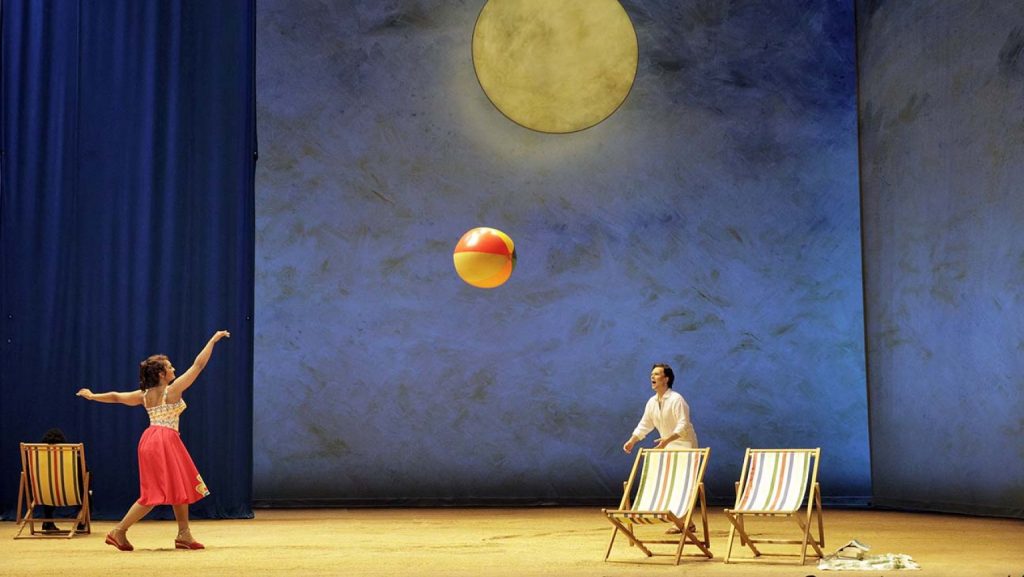 4:49 PM PST 2/4/2020 by
4:49 PM PST 2/4/2020 by
This L.A. Opera world premiere unites the “genius” trio of composer Matthew Aucoin, playwright Sarah Ruhl and director Mary Zimmerman to retell the timeless Underworld myth.

It took a trio of MacArthur Fellows — composer Matthew Aucoin, playwright Sarah Ruhl and director Mary Zimmerman — to bring to the boards L.A. Opera’s world premiere Eurydice, a vibrant and musically of-the-moment take on a tale that has been adapted to the medium roughly 70 times before. (This version also follows swiftly behind Broadway’s Hadestown, winner of the 2019 Tony Award for best musical.) Based on her 2003 play, Ruhl’s libretto re-centers the narrative away from Orpheus onto the oft-ignored Eurydice while Zimmerman’s nimble direction treads a deft line between the buoyancy and despair at the heart of Aucoin’s score, an effervescent melange of varied musical influences.
The L.A. Opera artist-in-residence’s fugue-like intro prefaces a happy beach scene where Orpheus and Eurydice frolic on the eve of their marriage. Meanwhile, in the Underworld, her recently deceased father writes his thoughts to his daughter on her wedding day. His letter finds its way to Hades who uses it to lure Eurydice to his penthouse. There she suffers a fall and arrives in the Underworld via an elevator in which a rain shower washes away her memory. And so, when finally reunited with her father, she mistakes him for a porter.
Ruhl began writing the play soon after the death of her own father while she was at Brown University. She had enrolled to study poetry but switched to theater under playwright Paula Vogel. For millennia the question surrounding the myth has been, why did Orpheus look back? Is he an artist so consumed by craft that he lost track of the people who give life meaning? Is he an egotist driven more by the heroic act of rescuing his beloved than by his actual love for her? Is she a muse who might fail to inspire once she’s made earthly again? Or, as Ruhl’s libretto has it, is it because Eurydice calls to Orpheus?
By doing so, she raises a whole new set of questions. Why, when on the threshold of rebirth, did Eurydice choose to die a second time? Is a song, as the libretto has it, “two dead bodies rubbing under the covers to keep warm”? And is loss the nature of love?
Singing the role of the Father is Rod Gilfry, the composer’s baritone of choice since working three years with him to shape the role of Walt Whitman in his first opera, The Crossing. Gilfry’s first act aria, in which he teaches Eurydice her name, restoring her self-knowledge and thereby her identity, highlights his warmth as a performer as well as the round resonance of his singing voice.
Making his L.A. Opera debut, Joshua Hopkins as Orpheus often sings in tandem with countertenor John Holiday, combining to create a halo effect to suggest Orpheus’ singular musical talents. But it is red-hot soprano Danielle de Niese in the starring role who is the beating heart of the story. She lives up to her promise at the end of the first act with her ecstatic solo about loving an artist, mirrored by her second act climactic message to Orpheus’ next wife on how to care for him.
As Hades, Barry Banks sings a high-end tenor, locating a range as singular as his emerald green plaid costume. It pops out of the play’s otherwise monochromatic color scheme but is ultimately upstaged by designer Ana Kuzmanic’s evocative stone-like costumes for the chorus, whose passages demonstrate a sophisticated tonal range reminiscent of composer John Adams.
A Tony winner for 2002’s Metamorphoses, director Zimmerman reunites with longtime scenic design collaborator Daniel Ostling, who provides her cast plenty of space to ponder in his sparse bardo marked by a penumbra sun and a squalid shower stall where the waters of forgetfulness rain down.
Aucoin’s score is alive with emotion and musicality throughout, calling on virtuosity from every corner of the pit while also servicing the tonal shifts and emotional demands of Ruhl’s libretto. His influences appear to be everyone from Philip Glass through Richard Wagner to Gyorgy Ligeti, combining the best of each under the umbrella of his own distinctive style. Being called classical music’s wunderkind and a genius makes great the expectations surrounding Aucoin’s first big main-stage opera, which travels to the Met in New York next year. With Eurydice, he measures up.
Venue: Los Angeles Opera, Los Angeles
Cast: Danielle de Niese, Joshua Hopkins, Rod Gilfry, John Holiday, Barry Banks, Stacey Tappan, Raehann Bryce-Davis, Kevin Ray
Composer: Matthew Aucoin
Librettist: Sarah Ruhl, based on her play
Director: Mary Zimmerman
Set designer: Daniel Ostling
Costume designer: Ana Kuzmanic
Lighting designer: T.J. Gerckens
Choreographer: Denis Jones
Presented by L.A. Opera, Metropolitan Opera

Leave a Reply